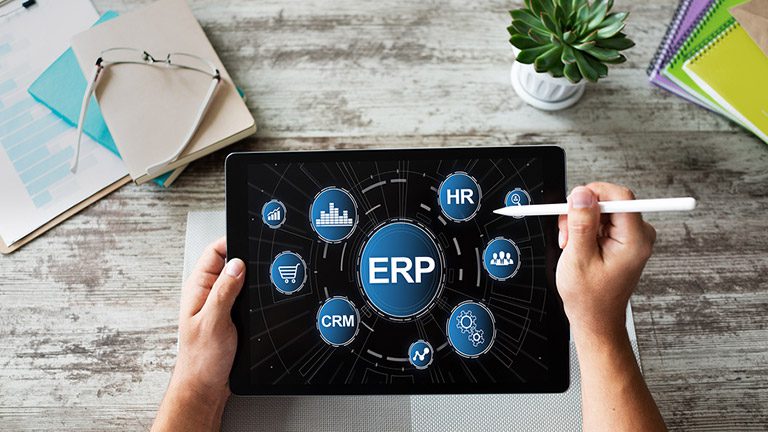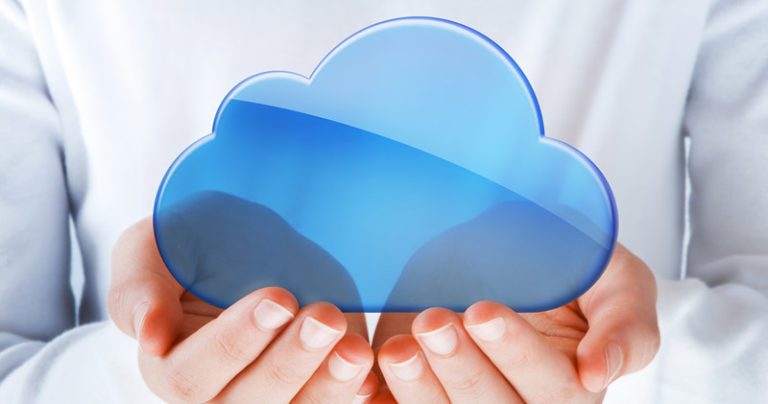At their core, both Enterprise Relationship Planning (ERP) and Client Relationship Planning (CRM) software promotes beneficial business solutions used to increase revenue and productivity for organizations of all different sizes. But you might be asking yourself, “What is the difference between ERP and CRM software?”
As they do have some overlapping attributes, in reality, they both play vastly different roles when it comes to how they are used to meet the greater business goals of your organization. Let’s learn more.
What is the Difference Between ERP and CRM Software?
When it comes to ERP vs. CRM: CRM systems are more sales-orientated in nature, managing relationships of prospects and customers. In comparison, ERP systems are more used to amass the flow of data connected throughout all areas of the business to manage various resources including staffing, accounting, materials, logistics and more.

What is CRM?
An automated CRM tool is used to store and process your company’s interactions with current and potential customers. It can create sale projections, send invoices and other communications. Its primary use is to nurture prospects down the sales funnel. The data recorded within the system becomes standardized, allowing it to be easily secured, managed and shared internally and externally.
A CRM lets users deposit and manage data about the leads they are pursuing, and the customers they are delighting. With more information accumulated, the sales and marketing teams can churn out more efficient campaigns at a faster rate. A CRM improves efficiency, increases sales and offers more accuracy with customer data.
Some core features and benefits of CRM software include:
- Managing leads and prospect
- Overseeing Accounts and contact information including details on interactions, pain points, demographics and personal details
- Conducting opportunity tracking like what stage, probability-to close, opportunity-to close and more
- Automating marketing campaigns and redundant tasks
- Identifying new leads
- Enhancing the sales process
CRM software comes in all shapes and sizes. It can range from basic to highly sophisticated. In some case, developers of these products will include other functionality within its toolset that could include automated efficiencies other than just managing Customer relationships. However, those functions could be less robust than what an ERP system can offer.
Some ERP software options contain a basic CRM tool built-in already, but depending on your requirements, it may not work the way you expected or is lacking in capability. It’s important to forecast for the future when adding automated tools to your budget. If you have to scale after implementation, you’re just going to be wasting more time and money doing so.
What is ERP?
So, with CRM software you have a tool that mostly focuses on managing current and potential customer relationships. On the other hand, you have an ERP system, which is made up of assorted, automated tools that are used to connect, manage, secure and transfer high-compliance data between internal departments and any third-party partners you work with.
For example, stakeholders across the company can share data and learn new insights into their processes and resources that directly affect productivity and capital gains. With a basic ERP system, you can enhance transparency, and tear down departmental silos with modules that support human resources (HR), accounting, finance, manufacturing, analytics, customer care, logistics, sales and more.

You should expect these core features and benefits from basic ERP software:
- Overseeing manufacturing activities and resources
- Managing finance and accounting processes
- Reporting with real-time analytics
- Governing inventory and other management workflows
- Sending alerts and communications to appropriate stakeholders
- Connecting business strategy across all departments
One benefit to using a single-system ERP tool is that end users do not have to worry about signing in to multiple accounts to manage their data. This helps you to reduce the time spent logging in/out of applications used, as well as reducing security risk due to weak password creation.
With that said, a basic ERP system is built for the broad and many. You may find that the capabilities from an out-of-the-box system may be limited in capability. You may need to integrate other technology to your system if the current standards don’t meet your requirements. So, do your research and know what you are signing up for before implementing the system.
Improving Business Processes with ERP and CRM Software
Let’s recap: CRM software is an automated tool that focuses mostly on fixing a single process, managing customer relationships. In comparison, ERP software consists of various tools or modules that automate processes across your business, intertwined within a single-system, potentially containing a basic-CRM module installed within already.
So, to improve business operations for your company, it may be in your best interest to adopt an ERP system that is built to scale for the future. And if the management of customer relationships is at the top of your list, it’s best to either:
A. Find an ERP partner with great CRM functionality and other assets, built to scale is preferred regardless of choice
B. Find an ERP partner that is built to scale and integrate it with a dedicated CRM provider
The Pros and Cons of integrating a CRM tool within an ERP System
Some pros and cons include:
Pros:
- A centralized location to standardize, secure, manage and transfer data
- Modules between systems within the ERP can be filtered and organized together; i.e. CRM data accessed by manufacturing to improve a shared process
- Create extensive reporting between business areas with real-time data
- There are affordable options for businesses of all sizes in ERP/CRM capability
Cons:
- For many small businesses, an ERP system, or even a standalone CRM module can be too costly. With that said, to get them started there, are free to cheaper alternatives, but the capability and scalability will need to be prioritized
- To implement and learn either system, it can be very time-consuming to get the technology understood and up and running
- Not all modules or systems are easy to learn
- You may face resistance to change by employees. If the technology is confusing or too time-consuming to learn, your staff may refuse to adapt to the changes.
It’s important to realize that finding technology to adopt for your company is a long and thoughtful process. You need to work with your technology partners and end users to determine what route makes sense for your business on the technology you employ. The only wrong way to go about purchasing this software is not establishing your needs for now and into the future.
The Pros of Cloud-Based Technology Solutions
When adding ERP or CRM solutions, or any technology really, many businesses are seeing the benefits of cloud-based performance. It allows them to rent the tools on a contractual basis, instead of paying extensive amounts of money to host the software on-premise. Another benefit is that updates are quick and seamless, over the cloud. These tools allow businesses to scale immediately when their requirements demand it.

Choosing between a CRM module or an ERP system
This one is simple. Pick what you can realistically afford.
Consider the technology, the reputation of the provider you’re working with, the integration capabilities, troubleshooting and support they offer for example. If you’re limited in the amount of money you can spend, there are free, or cheaper options for both CRM and ERP technology available out there. Take note the technology will be limited.
If the biggest need for your company is to have a better customer relationship management process, then concentrate on getting that set up first. Make sure it can scale for the future when you are ready to add other modules with it or want to add your CRM to an entire ERP system.
Cloud-based technologies offer you the most flexibility when it comes to scaling your technology quickly and efficiently.
Arcoro’s Cloud-Based Solution: Automate HR Management, Talent Management and Payroll Processes
Another toolset you can either purchase as a standalone or can integrate with existing third-party technology is Human Capital Management (HCM) platform. The Arcoro cloud-based platform has a built-in integration with over 300 partners including connections to ERP systems, CRMs, payroll processors, insurance carriers and a whole host of other technology providers.
The platform is built to enhance efficiencies for both HR professionals and the employees they oversee within critical processes that fall under HR Management, Talent Management and Payroll Processing. Administering benefits, navigating ACA compliance, overseeing time and attendance, building employer brand, succeeding tenured employees and more is possible with dedicated HR automated modules running the process.
The full platform can be offered in full, or by individual module, easily scalable, allowing you to add or remove functionality as your requirements demand it. Enhance your key HR processes with the following modules:
- Core HR (featuring a robust Employee Self-Service tool)
- Benefits Management
- ACA Compliance
- Time and Attendance
- Payroll Processing
- Applicant Tracking System
- Onboarding
- Performance Management
- Learning Management
- Succession Planning
Schedule a demo today to see the platform in action.
Are you interested in becoming a partner with Arcoro? Let’s qualify you today.




